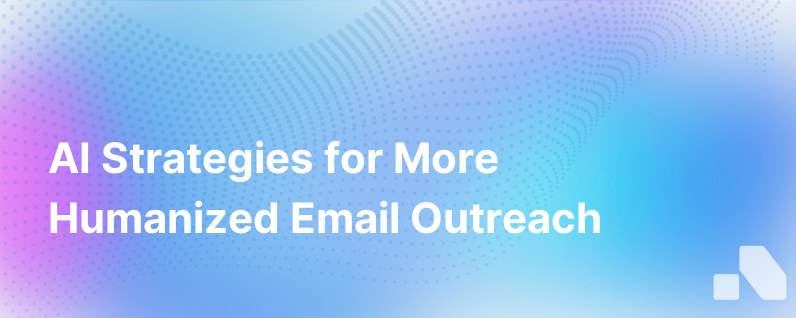
In an increasingly digital world, the art of email communication has never been more critical, particularly in the realm of B2B interactions. Yet, a common sticking point is the risk of crafting emails that sound impersonal or robotic—a stark contrast to the tailored and empathetic touch human sales and marketing professionals aim to convey. As we continue to marry salesmanship with technology, Artificial Intelligence (AI) emerges as a powerful ally, transforming the dreaded robotic email into something that resonates on a human level.
Here's how AI can help polish your email strategy for more meaningful engagement:
Understanding Natural Language Generation (NLG)
The AI-driven capability of Natural Language Generation stands at the forefront of crafting human-like text. NLG is the process of converting data into a narrative that is not only engaging and readable but also perfectly nuanced to resonate with the reader on a personal level. This advanced technology can analyze customer data and past interactions to craft individualized introductions that demonstrate an understanding of the recipient's needs and history with your brand.
For example, instead of starting with the generic "I hope this email finds you well," NLG can reference a recent event or achievement in the recipient's professional life, creating an immediate connection and showing that you're paying attention.
Human Touch Through Predictive Personalization The days of "Dear [FirstName]" as the pinnacle of email personalization are long behind us. AI’s predictive personalization dives deeper, synthesizing various data points such as the recipient's role in their company, their industry, past purchases, past email interactions, and even social media activity to create fully customized content.
Let's say you're reaching out to a lead who recently engaged with a webinar your company hosted. AI can craft an email that references specific topics from the webinar that the recipient showed interest in. This level of personalization can dramatically improve engagement and response rates.
Emotional Intelligence with Sentiment Analysis AI isn't just about data and patterns; it's also about understanding the emotional context. Sentiment analysis, a subset of AI, interprets the emotional tone behind words—enabling your emails to respond appropriately in tone and content.
For instance, if a customer expressed frustration in their last correspondence, AI can pick up on this and help draft an email that acknowledges their feelings, offers a sincere apology, and presents a solution. This ensures that your response aligns with their emotional state and can help defuse potential issues before they escalate.
Example: Crafting Email Content with AI
Here's how each AI-driven approach contributes to a less robotic and more conversational email:
NLG-Integrated Introduction: "Congratulations on the recent acquisition announcement, Mark! It's an impressive milestone, and I'm excited to see the innovative directions you'll take the company."
In this line, NLG uses specific and timely information to make a personal connection.
Predictive Personalization for Contextual Relevance: "I noticed you expressed interest in our risk management tools during our last webinar, particularly those that help mitigate industry-specific issues like supply-chain disruptions. I would love to dive deeper into this and explore how we could tailor a solution for your unique challenges."
Here, AI's predictive capabilities are applied to reference the recipient's interests, honing in on relevant topics.
Sentiment Analysis for Emotional Resonance: "I understand that the recent delays have been a significant inconvenience for your team. We’ve taken a thorough look at the issue and I'm confident that the steps we've implemented will prevent future occurrences. Your experience means a lot to us, and we're committed to making this right."
Sentiment analysis equips the email with an empathetic tone, recognizing the recipient's prior frustration.
Beyond the Inbox: AI’s Wider Sales Implications
While AI helps humanize email communication, its benefits extend further into the sales ecosystem. By analyzing sales conversations across email communications, AI can offer insights into broader trends, enabling your team to refine strategies and tailor outreach for maximum effectiveness.
AI can also identify which email content garners the best responses and engagement, allowing you to replicate successful tactics and constantly improve your messaging strategy.
Embracing AI for Empathy at Scale
Incorporating AI into email communications isn't about delegating the human aspect of your business to machines. Rather, it's about leveraging technology to enhance and scale the natural empathy and understanding that form the bedrock of meaningful client relationships.
By understanding and implementing NLG, predictive personalization, and sentiment analysis, you can ensure that every email from your business feels like it was written by a friend or trusted advisor instead of a faceless corporate entity.
In closing, remember that AI is a tool in service of human connection. It empowers you to write less robotic, more heartfelt, and effective emails, bridging the gap between digital efficiency and the timeless art of personal touch.
Aomni, with its innovative AI platform, recognizes this need for warmth in the digital landscape. It offers the precise tools required for B2B sales teams to craft emails that stand out for their humanity in an inbox crowded with automation. By minimizing effort and maximizing personalization, Aomni helps businesses connect in a way that's unfailingly relevant and refreshingly human.
In the world of B2B sales, where competition is fierce and relationships are king, AI provides the edge necessary to not only be seen but felt. After all, the most memorable messages in our inboxes are those that understand and speak to us, not at us.